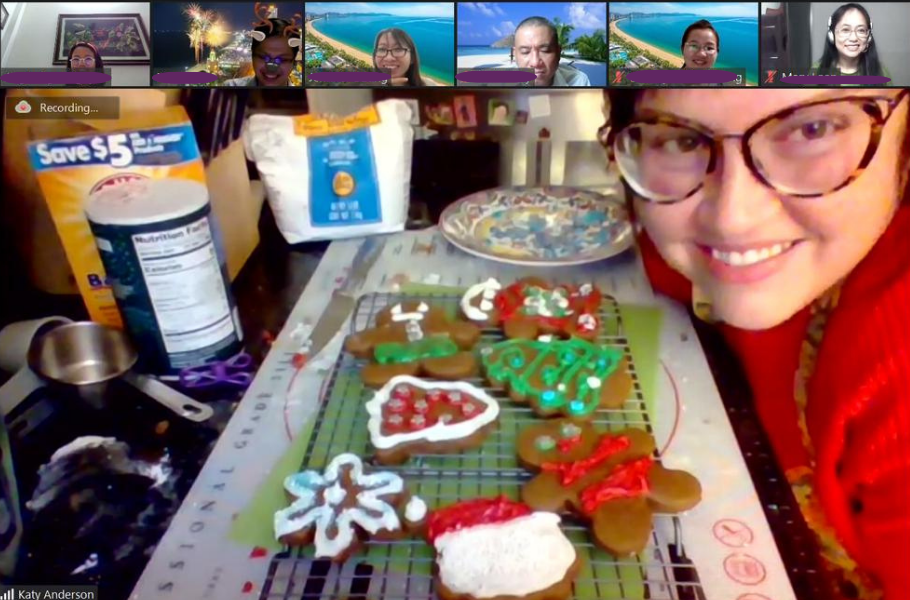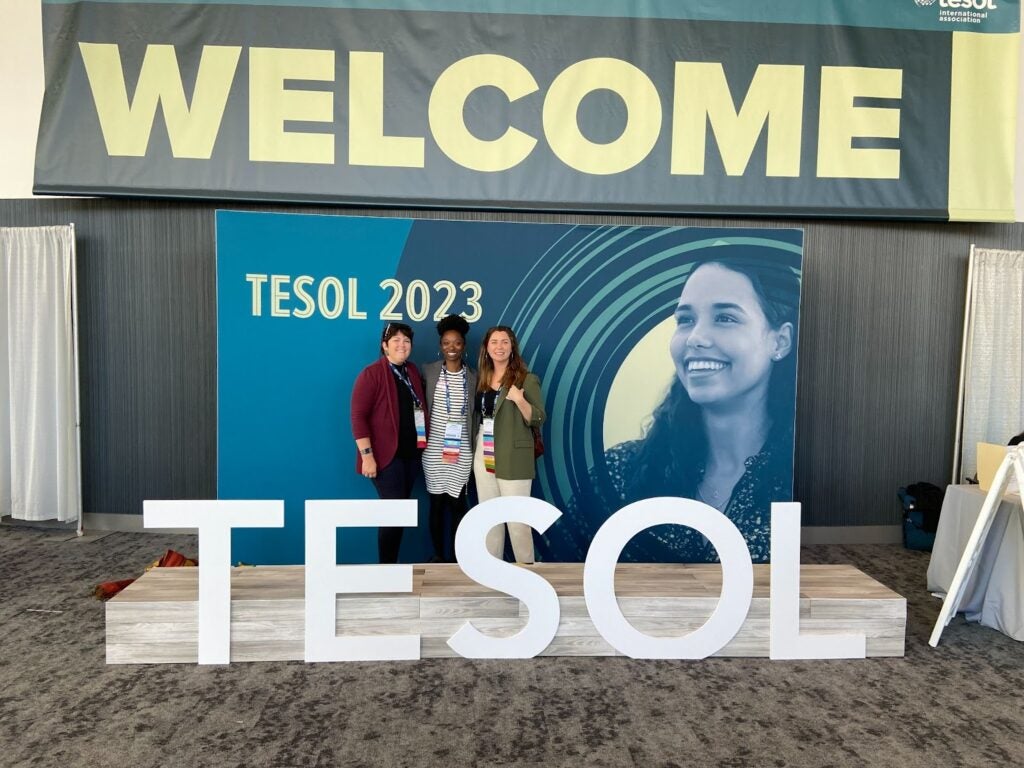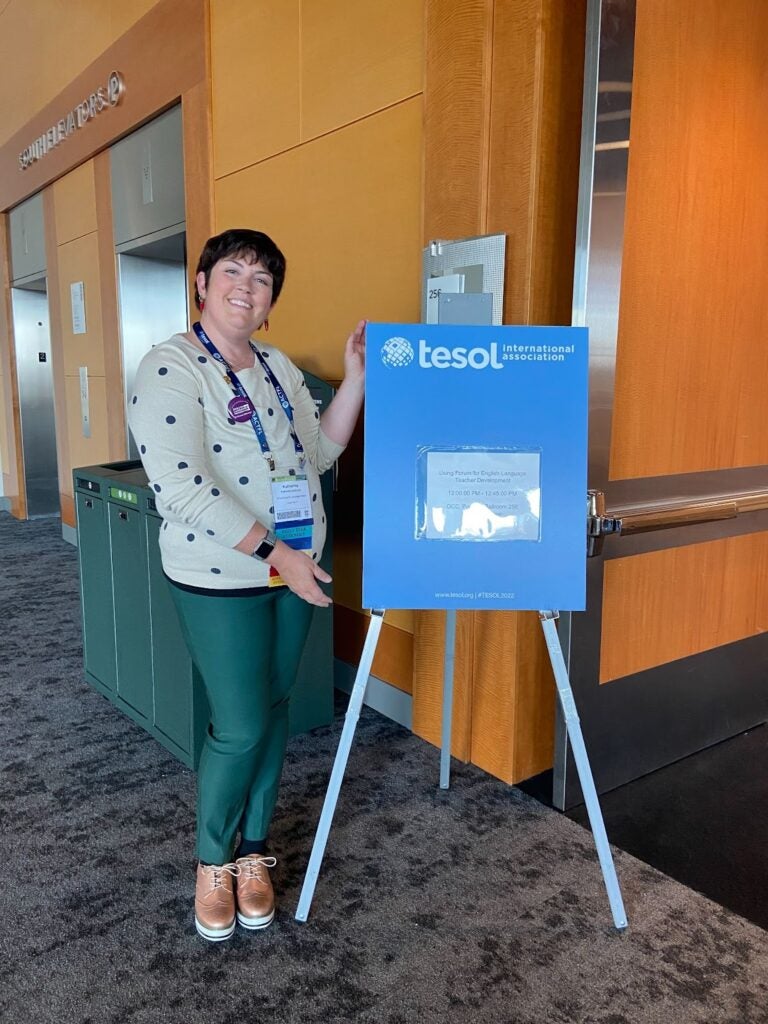I love working with adults because I feel that is where my teaching can make the largest impact on students’ lives.
After a brief stint teaching abroad while studying in Latin America over ten years ago, Katherine Anderson returned to Texas where she formally began her career in TESOL. Although she had initially studied English for secondary education, she found her passion to be in teaching adults. Anderson has taught English language at a variety of colleges and universities and also with social service agencies to support recently arrived refugees.
Even though she loves to travel and learn in person, Anderson’s responsibilities in the United States, which include family, limit her ability to just pick up and go. After years of teaching those who have relocated to her community, she decided to try something new–meeting students in their home country, virtually. This led her to explore professional opportunities in online education and apply to the Virtual English Language Educator Program. When she received the opportunity to teach business English online for employees of the Department of Foreign Affairs in Khanh Hoa, Vietnam, Anderson accepted the assignment noting that she has “never been one to back down from a challenge” and eagerly welcomed the opportunity to try her hand at teaching an English for specific purposes course.
Memorable Moments
My heart was so full of gratitude that day. It was one of those moments that you know you have chosen the right job!

During Anderson’s four months as a Virtual Educator, opportunities presented themselves to momentarily step back from the core class content and build camaraderie with in-class extracurriculars. At times, Anderson had this built into her course plan, like during the lesson where she broke from the normal routine with a pan of the camera over to a table topped with flour and measuring spoons to share her passion of cooking with the class. Although they weren’t able to try the gingerbread cookies, her students enjoyed learning more about the language of mixing and baking through a live demonstration. “It was a great moment in our class that cemented us together,” Anderson recalls. And other times, it was a more impromptu decision to better meet students where they were. This was especially important during the World Cup, when students’ attention was divided, and very much on the side of the game. To recognize Vietnam’s match with Thailand, together they wore team colors and chanted “vô địch [unrivaled]!” to cheer them to victory on the pitch.
Another memorable moment happened on her birthday. Anderson found that sharing and celebrating with others is very much a Vietnamese tradition when she showed up for a lesson only to find an empty room. After a brief wait, the suspense dissipated as the whole class popped into the space to sing happy birthday to their teacher and congratulate her with their well wishes!
A Multimedia Approach
Technology skills are a must for the modern business world, especially when operating on a global scale.
Narrowing in on the curriculum, Anderson drills down the importance of integrating technology skills and digital media into classroom learning. Her students are civil servants, government officials, and other working professionals. While the skills of giving presentations and drafting and replying to emails with the correct level of formality are very much relevant, there are also skills to learn that are newer for many, such as editing video or audio presentations and collaborating on shared cloud-based documents. In the classroom, Anderson uses YouTube as a platform to host original content. Her students create and post their own videos to their class channel, and they also have access to the channels maintained by other class sections. Outside of the classroom, working professionals may not have much extra time for study, but Anderson is able to extend their learning opportunities with a dedicated class group through WhatsApp. She encourages students to practice English by sharing on low-pressure topics via voice message, which they can easily create and even re-record when they are not satisfied with their speech.
A Year of Professional Development
I had never taught English for specific purposes. I felt like an imposter in this assignment, but I’ve never been one to back down from a challenge…
As her assignment comes to an end, Anderson looks back on her journey as one of professional growth peppered with new opportunities and future possibilities. Her project’s success resulted in an invitation to join a cohort of Virtual Educators and international program participants in a pre-convention professional development workshop before the TESOL 2023 Convention & English Language Expo in Portland, Oregon. Highlights of the week included a city tour that culminated with sampling locally famous donuts and coffee and presenting about the program with her new colleagues.

The whole experience, from teaching online ESP courses to meeting and collaborating with other Virtual Educators, has strengthened Anderson’s pedagogical skills and furthered her interest in continuing to work with adult learners to meet their professional needs.

Katherine Anderson is originally from Dawson Springs, Kentucky. She completed her undergraduate work at Murray State University where she took the opportunity to study and teach abroad in Latin America. Anderson has worked in English Language Education since 2012. She holds a Bachelor of Arts in Secondary English Education and a Master of Arts in English with a focus in TESOL. Anderson began her career in TESOL at Catholic Charities in Fort Worth, Texas, teaching English to newly arrived refugees from all over the world. Since then she has worked at secondary schools, colleges, and universities supporting English Language Learners. Currently, she is serving as a Virtual Educator for Khanh Hoa Province, Vietnam, teaching government officials, civil servants, and other professionals business English. She is passionate about making her classes engaging and valuable to her students.
